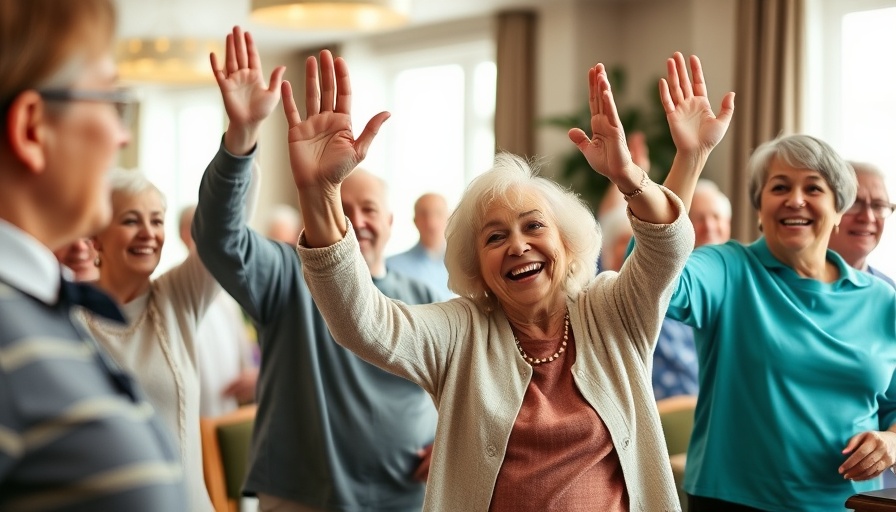
Understanding Parkinson’s Disease: More Than Just a Tremor
Parkinson’s disease is often reduced to the image of someone shaking uncontrollably, but there’s so much more to this complex neurological disorder. Recognizing Parkinson’s early is crucial, especially for older adults who may be at risk. While it primarily affects adults aged 60 and older, symptoms can often precede a diagnosis by years. Early detection allows for better management and support, which can significantly improve the quality of life for those affected.
Identifying the Early Signs of Parkinson’s Disease
Knowing the signs of Parkinson's is vital for proactive care. Here are nine key symptoms that you shouldn’t overlook:
Restless Sleeping: This symptom may manifest as thrashing or talking during sleep. It highlights the brain's struggle with sleep regulation, which can be significantly affected by Parkinson's.
Tremors: Often the first thought when one hears about Parkinson's, these tremors usually begin on one side of the body. They are most noticeable when the person is at rest.
Loss of Smell: A reduced capability to identify scents can be an overlooked early symptom. Many may dismiss this as a part of aging, but it can precede other motor symptoms by years.
Micrographia: An observable change in handwriting can indicate the impact of Parkinson's on fine motor skills. You may notice your loved one’s notes becoming cramped or smaller over time.
Stiff Walking: This can range from a noticeable stiffness to an altered gait, such as shorter steps. Many confuse this with natural aging or arthritis.
Constipation: While commonly seen as merely a digestive issue, constipation can signal Parkinson’s’ impact on nervous system function.
Speaking Softly: Changes in vocal volume, often leading to softer or more hoarse speech, may be an early red flag, brewing from neurological decline.
Emotional and Mental Health Considerations
Parkinson’s does not only affect motor skills; it can also impact emotional and mental health. Individuals may experience feelings of anxiety or depression as their independence decreases. Recognizing these emotional signs is equally important, as they can be as detrimental as the physical symptoms. Engaging your loved one in open discussions about their feelings can provide them with much-needed support.
Addressing Concerns: How to Approach the Subject
If you suspect your loved one may be experiencing symptoms of Parkinson’s, broaching the topic can be sensitive. It’s essential to approach the conversation with empathy and understanding. Here are ways to effectively express your concerns:
Find a Comfortable Setting: Choose a calm, private space for the discussion. This can help the person feel safe to express their feelings and fears.
Explain Your Observations: Use specific examples from their daily life to illustrate why you’re concerned, ensuring to focus on your love and concern for their well-being.
Encourage Professional Help: Suggest scheduling a doctor’s appointment for further evaluation while being supportive during this process.
Strategies for Managing Parkinson’s Disease
Once diagnosed, managing Parkinson’s is about maintaining quality of life. Here are some strategies to help your loved one live gracefully with the disease:
Engage in Physical Activity: Regular exercise can improve mobility and balance. Find activities they enjoy, whether it be walking, dancing, or swimming.
Nutritional Support: A well-balanced diet can ease some symptoms, especially digestive issues like constipation. Consulting a nutritionist for tailored advice can be beneficial.
Emotional Support Groups: Connecting with local support groups provides emotional respite. Sharing experiences with others facing similar challenges can bring comfort and insights.
Future Insights: Where We Stand with Parkinson’s Research
The landscape of Parkinson’s research is promising. Scientists are exploring genetic factors, advanced imaging techniques, and innovative drugs aimed at slowing disease progression or even altering its course. Staying informed about new findings can empower you and your loved ones to make better decisions regarding management and care.
Conclusion: Take Action to Support Your Loved Ones
Recognizing the signs of Parkinson’s disease is a powerful first step in preserving the dignity and quality of life of those affected. By understanding these symptoms, addressing concerns empathetically, and implementing strategies for management, you can truly make a difference. Encourage your loved one and yourself to become advocates for health and wellness, embracing the journey ahead together.
Awareness is crucial—don’t hesitate to seek help if you notice slightest indicators of Parkinson’s disease in your loved ones. Stay informed and proactive, for health and happiness go hand in hand.
 Add Row
Add Row  Add
Add 




Write A Comment